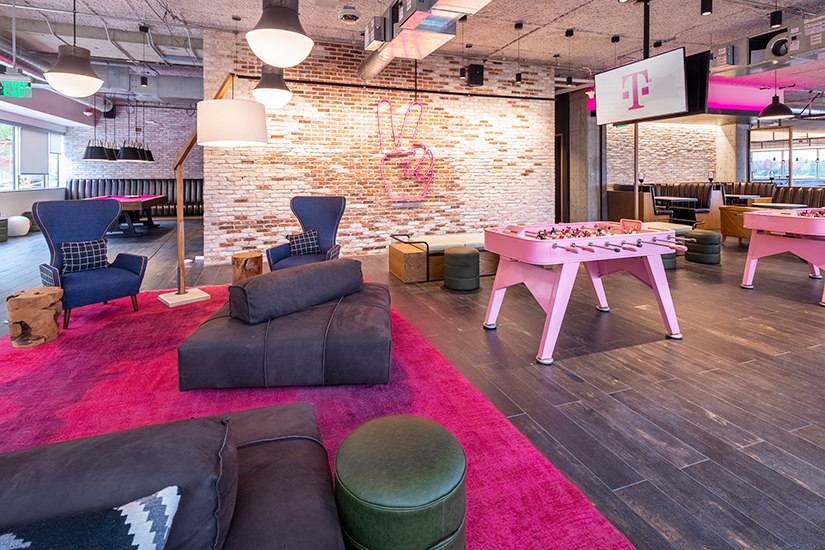|
Getting your Trinity Audio player ready...
|
When T-Mobile announced a multi-year, multi-million-dollar renovation of its Bellevue, Washington, campus in 2018, they couldn’t have possibly predicted the impact that their innovation would have on a world in lockdown. The massive overhaul and evolution of T-Mobile’s HQ has centered on connectedness. And it makes sense that a company whose entire purpose is centered on being the best in the world at connecting people to their world wanted to underline its commitment not just to its customers but to those working to make that mission happen.
T-Mobile Director of Workplace Strategy, Design, and Planning and Corporate Real Estate and Facilities Carol Reifsnyder oversaw the upgrades and unification of on-site technologies for all of the campus buildings that, luckily, also happened to prepare T-Mobile for the imminent pandemic. But while all that work meant that T-Mobile was uniquely prepared to pivot to remote work, it also means that most employees have yet to enjoy the multitude of new collaborative workspaces, huddle rooms, and other innovations that the company has introduced to its Bellevue, Washington, headquarters.

Reifsnyder says the renovation was prompted by the journey of T-Mobile into digital retail and what that meant for the future of the telecom industry at large. “One of the things that had really become clear with the focus on digital retail is that going forward, it’s going to be about helping folks to self-serve themselves,” Reifsnyder explains. “We had to ask ourselves some really serious questions—if that is the future, what does that mean for us?’”
As the focus of the company shifted towards technology, Reifsnyder says, T-Mobile needed to start thinking of itself in the same category as big players like Google or Facebook—whose offices, featuring amenities galore and futuristic designs, caused a paradigm shift in the very notion of what a workplace could be. The challenge for T-Mobile wouldn’t be just to redefine itself as a company but to evolve its own workplace to reflect this transformation.

After extensive benchmarking, observations, and employee surveys, several things became clear. Due to explosive growth, T-Mobile had a number of pain points in terms of overcrowding, and the campus couldn’t build fast enough to keep up. Secondly, the way people worked had shifted over time, and T-Mobile needed more collaborative space than individual workspaces. “Over half of our individual desks were empty on any given day,” Reifsnyder says. “On the other hand, it was hard to find a meeting room anywhere.”
T-Mobile’s solution to this, and to its new identity, are embodied in its HQ Building 2—the heart and hub of the Bellevue campus. The 153,694-square-foot building offers employees collaboration tables, meeting rooms, booths, and casual seating. Reifsnyder’s penchant for modernist design is present in sleek furniture and open areas, but it’s balanced by an intentional “hominess” that prevents the space from seeming cold or unwelcoming.

The renovation has provided four times the previous amount of meeting spaces, along with 672 sit-stand desks for all employees. New mother rooms, wellness rooms, and meditation/multi-faith rooms were also part of the build. Custom wallpapers and art underline T-Mobile’s commitment to diversity and embracing all the cultures that unite under the brand.
Skybridges now connect the campus, which can also double as informal meeting spaces, Reifsnyder says—a place where employees can stop to chat, with beautiful scenery to enjoy. Throughout the campus, employees will find outdoor decks, gaming areas, firepits, bocce courts, and giant chess sets (proudly colored in T-Mobile-magenta). Additionally, eight kiosks in the building’s Market Hall serve everything from barbecue to frozen yogurt. A full Starbucks and pub are also due to open when employees return to the workplace post-pandemic.

The director looks forward to the time when the entire company can gather for its quarterly all-hands meeting to celebrate its success. The design of Building 2 also includes a giant grand staircase where employees can sit and participate in proceedings, and an outdoor central plaza—another fantastic employee gathering area.
Reifsnyder says that while T-Mobile will continue leaning into a hybrid model of work, the company was dedicated to creating a place where employees would enjoy working together. “We want to be an employer that tech-minded people take seriously,” Reifsnyder says. “We believe the design we’ve set up for our headquarters underlines our commitment to collaboration and what it means to work here.”
Unified Brand and Technology
T-Mobile’s transformation isn’t limited to its physical spaces: the company’s technology partnership with Cisco has also had a massive impact. “We wanted a common experience for all of our users, no matter what building you’re in,” Carol Reifsnyder explains. “This included our Webex video conferencing technology, which couldn’t have come at a more important time for the organization.” The unification of T-Mobile’s collaboration with Cisco hardware and Webex software technology means that employees can work from anywhere, without worrying about having the right hardware or connections.


